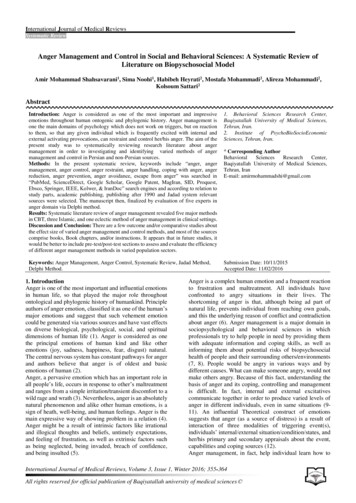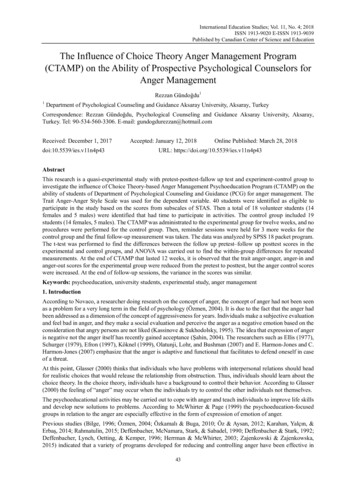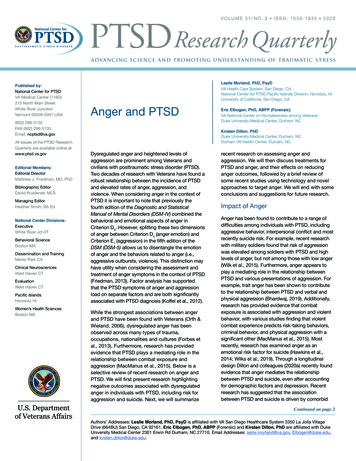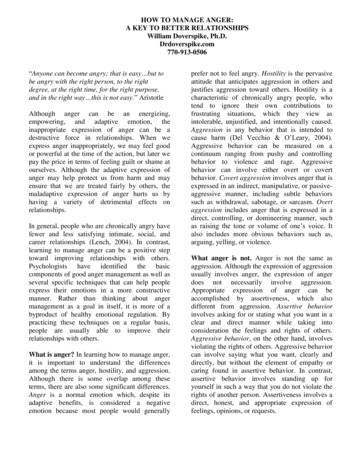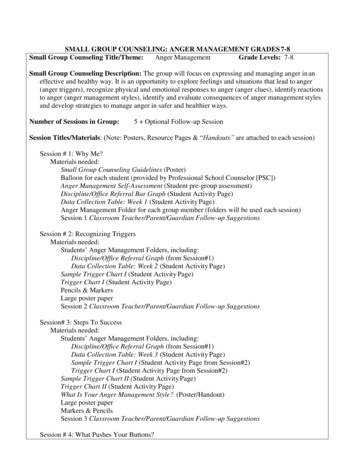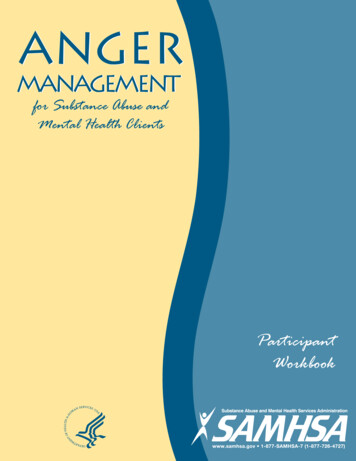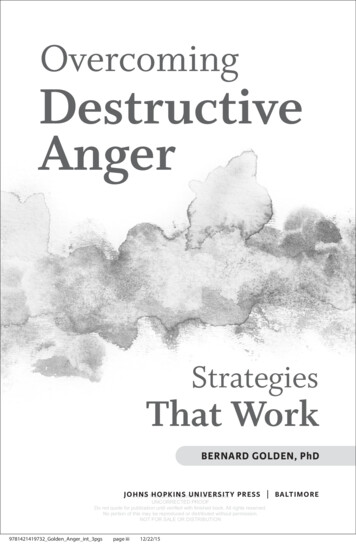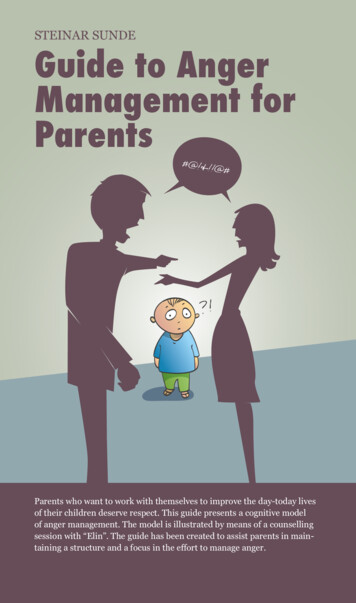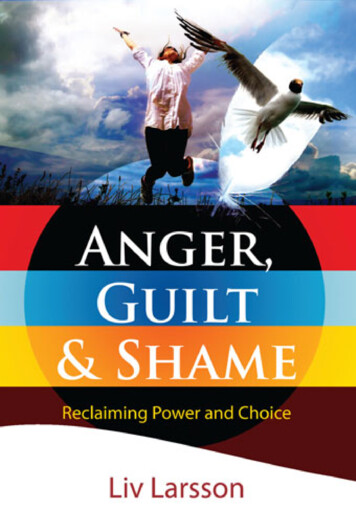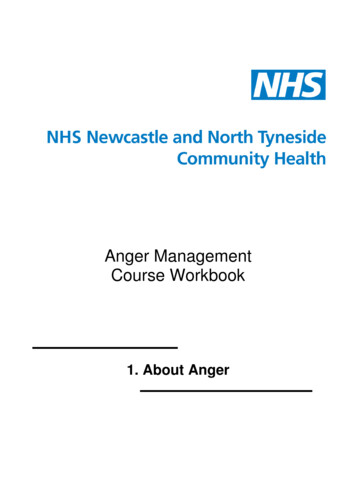
Transcription
Anger ManagementCourse Workbook1. About Anger
ContentsPageOutline of the six anger management classes3What is anger?4Anger, hostility, bitterness and aggression4Goals of class5Effects of anger on the body, behaviour and thinking6-7What triggers anger?9Getting to know your anger triggers13What makes anger worse?13Benefits & Costs getting anger16Emotional Brain v. Thinking Brain18Emergency Control20Tips to manage anger21Changing anger22Factors that increase the chances of succeeding261
The six classesThis course is made up of six classes and each class lasts 2 hours.Each class deals with a separate bit of anger, but as they all linktogether, it is important that you come to all six classes. However thefirst class aims to give a brief view of anger and offers emergencycontrol strategies. By coming to the whole course you will get the wholepicture.During the course you will be given information about anger and howyou may manage it. Keep the workbooks you get so that you can usethem in future. It is okay to write in these workbooks. You will not beasked to show your comments to anyone. They are personal to you.Week 1: about angerThe aim of the first week is for you to be able to understand more aboutyour own anger and how it works and factors which can make it worse.We will give you information about anger and what causes it as well aslooking at preparing to change and thinking about goals for change. Thisclass suggests emergency control strategies.Week 2: quick controlIn the second class we will talk about ways to help you manage youranger. We look at how to recognise the early warning signs of angerand quick ways of controlling your anger by looking in more detail atideas from the first class.Week 3: strategies to manage angerIn the third class we continue to look at ways of managing anger,building on what you learned in week 2. We will talk aboutassertiveness, taking care of yourself and a number of other strategieswhich you may find helpful.Week 4: relationshipsIn the fourth class we will look how to manage anger in relationships andto develop more helpful ways of communicating.2
Week 5: recognising & changing unhelpful thoughtsIn the fifth class we will look at identifying and challenging unhelpfulthoughts that trigger anger. We also consider ways to develop morehelpful thoughts about situations that currently lead to anger.Week 6: challenges to managing angerIn the final class we will talk about factors that can make it hard tomanage anger and ways of managing these challenges. We look atwhat might happen when you try to change your behaviour and how tocope with setbacks and increase your chances of success!3
What is anger?Anger is a normal feeling that we all experience. It is an instinctiveresponse to feeling threatened. When we become angry our bodieschange to meet the threat: tense muscles, pumping heart, etc. Wordsyou may use to talk about anger include: rage, mad, wound up, furiousand on your toes. Anger is often a sign that something is not right.Anger can let you know that you are being hurt, physically oremotionally. Anger can also tell you that your needs are not being met.If something is happening that is wrong you may feel angry. Anger is justan emotion which is neither good nor bad, it is what you do with it thatcounts.However, anger can have unwanted side effects. Anger can lead todifficulties in relationships, health problems, poor work performance, anddifficulties with “the authorities”. Anger is also connected withaggression and violence. Aggression is an action that is intended tocause injury, harm or damage, whilst anger is an emotion.Anger, hostility, bitterness & aggressionIt can be helpful to define the key words that relate to anger, so that youcan better understand your difficulties and better describe what youexperience.Anger is an emotional response to a threat, injustice, hurt or frustrationwhere the desire is to confront or damage the supposed source.Hostility is a belief that other people are threatening and the world isunjust.Bitterness is dwelling over hostile thoughts about a specific person oreventAggression is behaviour that causes physical or emotional damage toprotect from future harm4
Goals of the ClassIf anger is normal, why are you coming to an anger management class?Good question. After looking at the definitions on the previous page, itwould probably be better to call it something like “AggressionManagement” or “How to Express your Anger in a Healthy Way”rather than Anger Management.Therefore our goal is not to make anger go away. Rather it is to learn todeal with anger by using healthier ways that will empower you and allowyou to let go of the temporary illusion of power that aggression mayprovide.5
Anger affects the bodyWhen you get angry you may notice some of the following effects onyour body: Muscles tense Stomach feels in knotsup (jaw, fists, Pupils dilate to let in more lightshoulders) Sweating Breathing gets Unable to think clearlyfaster Feel out of body/unrealAnger raises stress levels and your body prepares for a stressfulsituation. This is known as a “fight or flight” reaction and we will look atthis in more detail in class 3. The physical signs of anger are often thesigns that let you know that you are angry and stressed. Part ofmanaging anger involves trying to lower your stress level.Anger affects behaviourAngry behaviours are often the signs that others notice. Some angrybehaviours are: Hitting Swearing Sulking Shouting Throwing items Self harm Pace around Clenching fistsAngry behaviours include aggression, irritability and going intoourselves. Angry behaviours are often what make anger a problem,resulting in trouble with family or the police. The strength, length andsetting off of anger are related to angry behaviours.Anger affects thinkingIt is not usually the situation itself that causes anger. Usually it is theway that you think about a situation that causes you to get angry or not.Angry thoughts include: He is so stupid He is selfish She is making a They didn’t do the right thingfool of me He is lazy I hate this place She didn’t respect me6
Angry thoughts often make you feel worse and the same thoughts willhappen again and again. It is important to remember that thoughts arenot facts and it can be helpful to widen your thinking.Understanding anger (1)Anger is not a big complex mess and from what we have said so far wecan see that we could put it into a picture like this. Understanding angeris the first step in controlling it and making it work for you.thoughtsbodyAnger feelingbehaviour7
Exercise 1: breaking up your angerThink about the times that you get angry and answer the following:1.What are the effects on your body (tick all that apply and add anyothers)?2. Muscles tenseHeart beats fasterBreathing becomes fasterMaking my hands into fistsStomach feeling knottedSleep problemsHeadachesSweatingProblems swallowingDry mouthFeeling unreal . . . What sort of things go through your mind (thoughts)? 3.What do you do when you get angry (behaviour)? 8
What triggers our anger?Anger is an emotional reaction to events or things which happen. Beloware some of the main triggers which can make us angry.Stress, Frustrations & DisappointmentA frustration is when you try to do something and are blocked ordisappointed. For example, when trying to mend a bicycle puncture andthe bike pump breaks.Annoyances, Irritations & ResentmentsThese are things that “get on your nerves”. Examples include: someone making a nuisance of themselves accidentally breaking something that you like tearing an item of clothing loud noises or interruptions when you are busyAbuseThis can be verbal or physical abuse. Verbal abuse can include namecalling, cursing, and other unkind remarks. The abuse can be obviousand direct. Other times it is less obvious like when someone tries tomake you feel a fool. Physical abuse includes pushing, grabbing,punching and kicking. This occurs much less often than verbal abuse.Injustice or unfairnessThese are situations where you have not been treated fairly. Anexample is when someone fails to carry out his or her promise. Youmay also get angry if you feel that someone else is being mistreated.TraumaWhen some thing horrible happens to a person they can experienceanger. Anger can relate to a sense of injustice or act as a defence tokeep others away. If you have experienced a traumatic incident and arestruggling to cope then consult your GP and seek psychological help.9
Understanding anger (2)1. frustrationTRIGGER2. annoyance 3. abusethoughts4. injusticebodyAnger feelingbehaviourOur understanding of anger now includes the immediate triggers for ouranger. Often we may find that it is the same sort of things triggering ouranger, sometimes it will be a variety of things.10
GaryGary, an electrician, was asked by his boss to go to a house to look atsome wiring that the owner thought might not be safe. He already had alot of work on and felt that his boss was taking advantage of him,knowing he wouldn’t complain (injustice).Gary could feel his breathing quicken and noticed his jaws clenching.He thought, “he always treats me unfairly, he’s just a lousy boss”. Garywas very short with his boss, to let him know that he was irritated. Hefinished off the work he already had and then took on the new job. Heknew that if he gave his boss a mouthful he would lose his job. Hecouldn’t get the situation out of his head that night. He kept thinkingabout it and was really irritable with his wife at home.Being asked to take on more work when already busyHe always treatsme unfairly, he’sa lousy bossFast breathingJaws clenchingAnger feelingShort with boss butkept thinking about it11
JennyJenny had been on at her daughter all day to tidy her room and she keptsaying she would do it in a minute or a bit later. Early in the eveningJenny found her daughter sitting in the bath just washing her hair. Shesaw her daughter as deliberately provoking her saying “what are yougoing to do about it then?” (annoyance)She had felt stressed all day. When she saw her daughter in the bathshe completely lost her sense of humour, she could feel her fists clenchand her voice got louder. These changes happened in the space of aminute or two. She thought “she’s just baiting me, the kid’s completelyuseless, she’s got no respect” Jenny says that she “really let rip”. Sheshouted and screamed at her daughter for around 10 minutes. Later herdaughter cleaned her room.Daughter not doing what was asked of herLost sense of humourVoice louderFists clenchingShe’s justbaiting me, she’sgot no respectAnger feelingShouted andscreamed for 10 mins12
Exercise 2: getting to know your anger triggersThink about what sort of things set your anger off and write them down.Think about: Particular places Certain people What really gets your anger going What makes anger worse?Whilst there is normally an immediate trigger for our anger there areoften more distant factors affecting whether or not we get angry. Not allof these will be present for everyone or all of the time. These factors willbe discussed in more detail later in the course, but for now it is usefuljust to be aware of them.RelationshipsThe relationships which we are in can be a big source of stress or atrigger for anger.Drugs, alcohol, caffeine, nicotine & steroidsDrugs, alcohol, caffeine, nicotine & steroids lead to physical changessimilar to when we feel frightened or angry. The brain can misinterpretthese physical sensations and go into defence mode because it believesthere is a threat. These substances also decrease our level of controlover behaviour. Think about a time when you were drunk would you actthat way when you are sober?13
Depression, anxiety, trauma, bereavementPsychological difficulties can complicate anger. These areas often needattention in their own right. Seek psychological help if these causeproblems for you.Living conditionsLiving conditions, for example, overcrowding, heat, debt, living in adifficult area, job insecurity etc. can all increase stress, increasing ourlikelihood of getting angry.Poor sleepA lack of sleep leads to poorer coping and less ability to find solutions.Also we are more likely to be irritable when tired.What can stop us reacting to anger?Even when there are triggers for anger we do not always get angry.There are some things that make it less likely that we will get angry oract on anger. We will look at this in more detail in a later class. Some ofthese things are: Not wanting the bad things that come with anger Taking time out Controlled breathing “cool” thoughts Support from friends and familyYou may already be able to think about some times when you did notget angry. Can you begin to think how this was possible or why you didthis?14
Understanding anger (3)TRIGGERThings that make anger lesslikelyThings that make angerworsethoughtsbodyAnger feelingbehaviourSo now, looking at our picture of anger, we have the angry feelingleading to angry thoughts, body and behaviour. We can see that there isan immediate trigger for anger. We can also now see that there areoften more distant triggers that can make anger worse or more likely.Finally, there are some things that can make us less likely to get angry.15
Benefits of getting angryAs we have mentioned before, anger is a normal human emotion. Ittherefore follows that anger has some uses or benefits. There arecertain times when anger can be helpful: Shows that something is wrong, eg. Noticing that someone hashurt us Gets us going to do something, eg. When we need to complain A way of expressing ourselves, eg. Telling someone that they haveupset usCosts of getting angryShowing our anger in certain ways can have downsides. Some of theseare: Relationship problems: loss of friends or break-up of marriage,possibly as a result of aggression or violence Health problems: prolonged stress or arousal can lead to highblood pressure, heart disease etc. Problems with authorities: aggression and violence can lead toproblems with police, probation, social services, health visitors,health services etc. Doesn’t get us what we want: often aggression and violence do noteven get us what we originally set out to get (e.g being listened to)or take away the hurtThe Tipping Point: when is anger a problem?Different people will have different views on when anger becomes aproblem. A simple way of thinking about whether anger is a problem foryou is to think about whether the costs outweigh the benefits. Anotherway to think about it is to notice whether others are saying that youranger is a problem. Sometimes people we care about, or authorities,even provide an ultimatum. For example you may have heard “sort outyour anger or I’ll leave you”, or “you need to get control of your anger ifyou want access to your children”. Anger can also be a problem if it isnot doing what we want it to do. For example, if you get angry in orderthat people listen to you, it is then a problem if people just walk awayfrom you when you get angry. Finally, anger can be a problem if it islasting too long, is too strong or leads to aggression.16
Understanding anger (4)TRIGGERThings that make anger lesslikelyThings that make angerworsethoughtsbodyAnger feelingbehaviourCOSTSBENEFITSPROBLEMWhen costsoutweighbenefitsFinally, we have a complete picture. This begins with the expression ofanger; feeling, thoughts, body and behaviour. Anger comes from animmediate trigger but there are things that make anger more or lesslikely to be expressed. And now we have benefits and costs of anger.The problem can come if costs outweigh the benefits.17
Emotional Brain v. Thinking BrainThis next section gives a brief explanation about how different parts ofthe brain acts when we are angry. Understanding how our brain workswill explain why we need to use certain anger management strategiesat certain times.The Emotional BrainWhen we say 'I didn't think, I just reacted', it is a result of our emotionalbrain responding to a threat. Our emotional brain is known as the LimbicSystem, which is responsible for emotion and emotional behaviour.There is a group of structures in the Limbic System including thehypothalamus, amygdala, olfactory bulbs, and hippocampus. It plays an important part in emotions & physiological (bodily)responses One of its main concerns is self-preservation. It’s always alert,constantly asking a very important question: “Is it safe?” It gets information before Thinking Brain and if there is danger,then it overrules the Thinking Brain by flooding it with hormones Flight or Flight response It has a memory that records all important threatening things thathave happened to us. It judges situations in broad terms: good/bad, safe/dangerousbased on previous memories that have involved threat.18
Thinking BrainThe Thinking Brain is located in the Frontal Lobes. The Frontal Lobesare responsible for: Feeling conscious, awake and alert. Making decisions, thinking, observations, planning, anticipates,responds, organises and creates new ideas. Logical thinking & questioning. They try to find a cause for everyeffect and an effect for every cause. They can control emotional brain if trained (Good News) But the thinking brain has its own prejudices that can triggeremotional brain response (Bad News)Six stages of the emotional brain response1. Information from our senses is sent to thalamus2. Information sent to amygdala3. Information is also sent to frontal lobes4. Amygdala does quick threat assessment5. If threat is seen as serious, then amygdala blocks by flooding it withchemicals thinking response6. Emotional response: ANGER Helpful for survival No real danger HIJACKED BRAIN19
Emergency ControlThe following ideas will be discussed in more detail in the next twoclasses. However people often want to try strategies now.When you become so angry that you either react or you can’t thinkclearly because your emotional brain has taken control, then you need tofollow the following strategies.1. Take SToC and Act(SToC STOP, THINK of CONSEQUENCES) How? Calm the Emotional Brain When you are calm you will be able to problem solve, decideon best solution (think of consequences) & act2. Know yourself What triggers your anger?What signs tell you that you’re on the brink of uncontrolled anger?What changes in you and around your health could lead to anger?What works to calm you down?3. Calm the Emotional Brain Hormones released when angry take from 10 minutes to one weekto leave your body. Why up to a week? Either the threat remains or you keep thinkingabout the wrong that’s happened to you. The Emotional Brainthinks that the threat is real when you dwell on hurt.20
4. Quick strategies to calm Emotional Brain:a.b.c.d.e.Time-out – walk awayRelax breathing/musclesDistract yourself, count to tenKeep quiet/bite your tongueAvoid anger-provoking situations and pick times/places whenyou feel more able to copef. Self-talk: “I need time to think this through”; talk yourself calm,what would your calmest friend say?5. Make good use of the Thinking Brain When you are calm ask yourself: What’s my problem? What do I want (is it that important)? What are my options & the consequences? What is my plan to carry out best option? Later, think what you achieved & what do you need to work onBrief Tips1. Always try to say I made MYSELF angry.2. Know what to overlook.3. Recognise that people aren't against you, they are merely forthemselves.4. Lower your voice.5. Recognise the hurt or fear that precedes anger.6. Recognise that another person's abusive behaviour says moreabout them and their emotional pain than it says about you.7. Ask yourself if your feelings of anger are helping your problemsolving skills.8. Avoid scorekeeping.9. Learn not to hit the sore spots.10.Ask yourself how important the issue will be in a week.11.Avoid mind reading.12.Learn to agree to disagree.13.Work on anger coping self-statements14.Respond instead of react21
What is change?When it comes to changing behaviour, think about what you did in thepast when you changed something. What did you do and what did youthink? Change is about doing something different or becomingsomething different. What is it that you want to do differently? What kindof person will you become?Stages of changeThis model helps us to identify where we are at in the cycle of change.By coming to the classes you could argue that you are thinking aboutchange. Hopefully you will start to move through these stages and reachthe maintenance stage and eventually achieve permanent change.However, change can be challenging and sometimes there aresetbacks/slips, but when this happens you don’t go back to square one,as you have previous knowledge of change. Also, if you slip then youmay progress to the action stage more quickly than before.Notinterestedin changeThinkingaboutchange.Determination& PlanningSlips &RelapsesActionMaintenance22
Ways of thinking about changeWhen it comes to changing behaviour, we can look at the behaviour in anumber of ways. The overall aim is to move from thinking about changeto acting on these thoughts. There are a number of questions that youcan ask yourself to help tip the balance from just thinking about changeto planning and doing something different.Advantages of changeBelow are a number of questions that aim to help you think about howlife could be better if you change. What are the advantages of making this change?How would you like things to be different?What would you like your life to be like in 5 years time?The fact that you are here shows that at least part of you thinks it’stime to do something - what are your main reasons for seekingchange?In the box below write down five things which will be better in the futurebecause you have changed.1.2.3.4.5.23
Optimism for changeBelow are some questions that aim to help you think about how youhave succeeded in changing in the past, and what strengths or skills youhave that help you to change. You can also think about who might beable to support you that you can trust. Think about other significant changes that you’ve made in the past- how did you do it? What personal strengths do you have that will help you succeed? Who could offer you helpful support in making this change? What do you think would work for you, if you decided to change?In the box below write down some things that would be helpful for you tochange, a past change you have made (e.g. giving up smoking or cuttingdown on your alcohol intake), your strengths (e.g. good talker or goodsense of humour) and the name of a person who would be supportiveand you could trust.1.2.3.4.5.24
Intention to changeBelow are a number of questions that aim to help you think about howwilling you are to change. The more important it is to you to change yourangry behaviour, the more likely you are to want to do something aboutit. Try to see that changing your angry behaviour will mean that you andthose around you will experience less pain and hurt. How much do you want to do this? What would you be willing to try? What will it take to help you succeed? So what do you intend to do?In the box below write down possible things you are willing to try in orderto manage your angry behaviour more effectively. Write down what youthink it will take to succeed.25
ConcernsHaving looked at what anger is, it is time to think about anger and you.What really concerns you about your anger?In the box below write down your concerns about your anger.Things that increase the chances of successThere are a number of things that will help you to succeed in managingyour anger:Practice: you need to practice the strategies which you havedecided to try.Perseverance: keep trying, even if you don’t have immediatesuccess.Patience: your anger difficulties took time to develop, it will alsotake time to learn how to manage your anger.Planning: plan what you are going to do, don’t take a randomapproach.Determination: you will need determination to succeedOptimistic Thinking: approach managing your anger from anoptimistic point of view. You are going to succeed at this.Responsibility taking: others may be able to help but ultimatelyyou are responsible for changing your behaviourControl: you can take control of your behaviour and can controlthe change in your behaviour.26
Remember, we rarely succeed the first time, let alone the second, third,fourth or fifth time.SummaryAnger can be understood and we have made up a picture of anger tobreak it into manageable bits. We can see that anger has benefits andcosts. There are some things that make anger more likely and somethings that make anger less likely. You may wish to consider avoidingbecoming a victim of your own anger.To change can be a challenge. However keeping things as they are andstruggling to control your anger is also a challenge. If you can recognisethat change is important and you can feel optimistic, then you increaseyour chances of succeeding. Increasing your knowledge about howanger affects you, learning new ways to cope and having a go are thesteps to managing your anger more effectively.27
Thinking for next weekThis week you have been given a lot of information about anger andchange. To get the most of this information it would help you to do somethinking before the next class. You might like to begin by re-reading thisworkbook and thinking again about the exercises we covered this week.Thinking about what you want to change and why will help you when youcome to the rest of the course. The following questions may help you tothink about your own personal goals.1. What change would you like to make? .2. Why is it important to you to make this change? .3. What steps can you see that will help you make this change? 28
you may use to talk about anger include: rage, mad, wound up, furious and on your toes. Anger is often a sign that something is not right. Anger can let you know that you are being hurt, physically or emotionally. Anger can also tell you that your needs are not being met. If something is happening that is wrong you may feel angry. Anger is just
